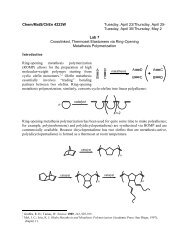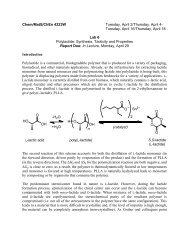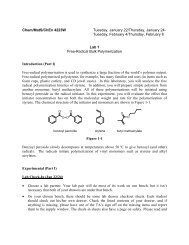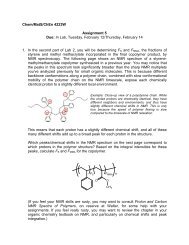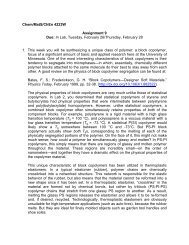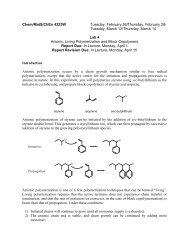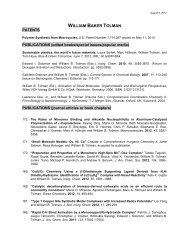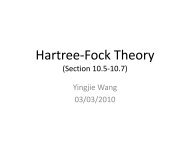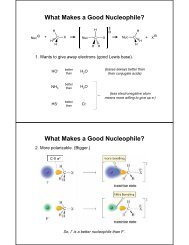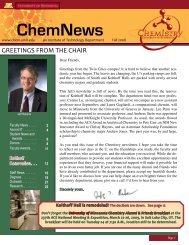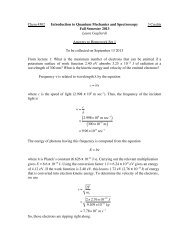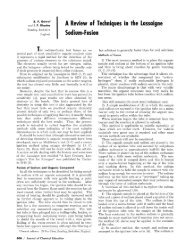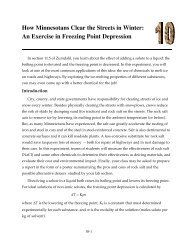Izaak Maurits Kolthoff - University of Minnesota
Izaak Maurits Kolthoff - University of Minnesota
Izaak Maurits Kolthoff - University of Minnesota
- No tags were found...
You also want an ePaper? Increase the reach of your titles
YUMPU automatically turns print PDFs into web optimized ePapers that Google loves.
<strong>Izaak</strong> <strong>Maurits</strong> <strong>Kolth<strong>of</strong>f</strong>, February 11, 1894—March 4, 1993 | By Jo...http://www.nap.edu/html/biomems/ikolth<strong>of</strong>f.htmlChemical Society (Nichols Award [1949], Fisher Award in Analytical Chemistry [1950], and theWillard Gibbs Medal [1964]), the Electrochemical Society Olin-Palladium Medal (1981), and thePittsburgh Analytical Chemistry Award (1981), as well as honorary doctor's degrees from the<strong>University</strong> <strong>of</strong> Chicago, Brandeis <strong>University</strong>, <strong>University</strong> <strong>of</strong> Arizona, <strong>University</strong> <strong>of</strong> Groningen(Netherlands), and the Hebrew <strong>University</strong> <strong>of</strong> Jerusalem. He was the recipient <strong>of</strong> numerous other honorsfrom chemical societies and universities abroad. In 1938 he was knighted to the Order <strong>of</strong> Oranje-Nassau<strong>of</strong> the Netherlands, and in 1947 he was elevated to a commander <strong>of</strong> the same order by the Dutch queen.He was elected to the National Academy <strong>of</strong> Sciences in 1958.One would expect that <strong>Kolth<strong>of</strong>f</strong>'s prodigious output could be accomplished only by running a large,efficient, and hard-driven operation. This indeed was the case in the latter two respects, but <strong>Kolth<strong>of</strong>f</strong>'sprogram was never particularly large. Nor were his interests <strong>of</strong> a routine nature that could lead to a largeoutput with little effort. Instead they were strongly focused on the elucidation <strong>of</strong> significant and complexproblems. The efficiency <strong>of</strong> his program derived from his talent for finding the most direct route towardsolution <strong>of</strong> a problem. While current analytical chemistry is strongly (arguably too strongly)instrumentation-oriented, <strong>Kolth<strong>of</strong>f</strong>'s work was chemistry-oriented. Much <strong>of</strong> his research was donebefore the great influx <strong>of</strong> increasingly sophisticated instrumentation after World War II. For him,instrumentation was a means to an end, not an end in itself. Nevertheless, he used the complementaryfeatures <strong>of</strong> different types <strong>of</strong> instrumentation available to him to great advantage, e.g., conductometry,potentiometry, voltammetry, and ultraviolet-visible spectrophotometry in addressing the dauntingproblems <strong>of</strong> nonaqueous solution chemistry.<strong>Kolth<strong>of</strong>f</strong>'s personal work habits were unusual. He would begin his workday by spending a couple <strong>of</strong>hours reading abstracts, papers, and research reports in the seclusion <strong>of</strong> his apartment in the FacultyClub <strong>of</strong> the university. At the same time he would write directives to his coworkers for future work onnotepaper printed at the top "From the desk <strong>of</strong> I. M. <strong>Kolth<strong>of</strong>f</strong>." All <strong>of</strong> us would find these notes on ourdesks later in the day. <strong>Kolth<strong>of</strong>f</strong> would not arrive in his <strong>of</strong>fice until 10:30 or 11:00. He would first dictateletters to his secretary, the highly competent Christa Elguther. He was a prolific correspondent andanswered letters punctually. During the afternoons he would have individual research conferences withhis graduate students and postdoctoral associates. The schedule in my own case was that I would turn inmy weekly progress report on Wednesdays. This always would be returned to me on Thursdays,annotated in the margins and sometimes across the text with numerous comments, suggestions, anddirectives. During Friday afternoons, I would meet with <strong>Kolth<strong>of</strong>f</strong> for half an hour to discuss the report.He evaluated everything in a highly critical way, but the majority <strong>of</strong> us understood the need for that.Some <strong>of</strong> his suggestions were monumental in scope, requiring good fortune and several months <strong>of</strong> hardwork, but they were presented with the clear expectation <strong>of</strong> a rapid solution. We all lamented suchunrealistic expectations. Towards the end <strong>of</strong> my four-year stay Stanley Bruckenstein (cozily finishedwith his research) gave me some sage advice: "When <strong>Kolth<strong>of</strong>f</strong> mentions a particularly daunting task,keep it in mind but do not necessarily work on it. If he mentions it a second time, begin working on it,and if he refers to it a third time you better have results to report." I only wish Stanley had divulged thisto me earlier in my career. Perhaps we worried too much about some <strong>of</strong> <strong>Kolth<strong>of</strong>f</strong>'s apparently unrealisticexpectations. One Friday afternoon he mapped out a new and wide-ranging investigation. As he wastalking, I was thinking, "I hope I will have something significant to report a month from now."<strong>Kolth<strong>of</strong>f</strong>, however, concluded by saying, "I travel to Iowa State tomorrow morning at 9 o'clock. Cometo the airport and report what you have found." After some soul searching I decided to ignore thisdirective. He never mentioned it again.<strong>Kolth<strong>of</strong>f</strong> could be harsh with his coworkers. I believe he did not fully realize just how intimidatinghe could be. Quite <strong>of</strong>ten after research conferences some <strong>of</strong> his graduate students and postdoctoralassociates appeared to be in a state <strong>of</strong> shock. <strong>Kolth<strong>of</strong>f</strong>, in turn, would grumble afterwards about "a tale<strong>of</strong> woe" and "babe in the woods." Nevertheless, the great majority <strong>of</strong> his coworkers became his devotedfriends after they left. <strong>Kolth<strong>of</strong>f</strong>, in turn, expended great effort in promoting their careers, at least forthose people who had satisfied him that they were serious pr<strong>of</strong>essionals. I was fortunate in getting toknow him well over a period <strong>of</strong> 40 years. He was a longtime friend <strong>of</strong> my parents-in-law, the Luytens,who were also natives <strong>of</strong> Holland. He would <strong>of</strong>ten visit to talk (in Dutch, mostly about politics and6 <strong>of</strong> 10 6/23/03 2:20 PM



